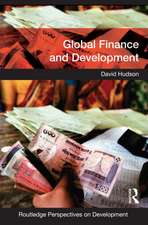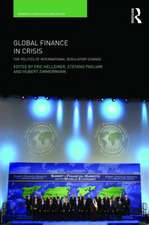Shari'a Compliant Microfinance: Routledge Islamic Studies Series
Editat de S. Nazim Alien Limba Engleză Hardback – 28 iul 2011
This book brings together original contributions from leading authorities on the subject of Shari‘a Compliant Microfinance (Islamic Microfinance) to propose innovative solutions and models by carefully studying experiments conducted in various countries. Where critiques of the current microfinance concepts, methods, regulatory measures and practices have often revolved around its practice of charging very high interest, this book discusses the several models that draw on both theory and case studies to provide a sustainable Shari‘a compliant alternative. Arguing that while Islamic finance might have made a remarkable contribution in the financial markets, there remains a big question with regards to its social relevance, the book provides new perspectives and innovative solutions to issues facing the Islamic microfinance industry.
A comprehensive reference book for anyone wanting to learn more about Shari‘a Compliant Microfinance, this book will also be of use to students and scholars of microfinance, Islamic finance, and to anyone interested in learning about ethical and socially responsible businesses.
Din seria Routledge Islamic Studies Series
-
 Preț: 310.65 lei
Preț: 310.65 lei -
 Preț: 326.49 lei
Preț: 326.49 lei -
 Preț: 387.20 lei
Preț: 387.20 lei -
 Preț: 349.53 lei
Preț: 349.53 lei -
 Preț: 419.92 lei
Preț: 419.92 lei -
 Preț: 389.66 lei
Preț: 389.66 lei - 13%
 Preț: 338.33 lei
Preț: 338.33 lei - 17%
 Preț: 237.93 lei
Preț: 237.93 lei -
 Preț: 417.20 lei
Preț: 417.20 lei - 26%
 Preț: 822.01 lei
Preț: 822.01 lei -
 Preț: 389.38 lei
Preț: 389.38 lei -
 Preț: 395.04 lei
Preț: 395.04 lei - 13%
 Preț: 307.22 lei
Preț: 307.22 lei - 18%
 Preț: 1214.92 lei
Preț: 1214.92 lei - 18%
 Preț: 1059.45 lei
Preț: 1059.45 lei -
 Preț: 416.22 lei
Preț: 416.22 lei -
 Preț: 485.40 lei
Preț: 485.40 lei -
 Preț: 389.38 lei
Preț: 389.38 lei -
 Preț: 466.25 lei
Preț: 466.25 lei -
 Preț: 451.41 lei
Preț: 451.41 lei -
 Preț: 442.93 lei
Preț: 442.93 lei -
 Preț: 490.25 lei
Preț: 490.25 lei - 18%
 Preț: 1000.27 lei
Preț: 1000.27 lei -
 Preț: 407.19 lei
Preț: 407.19 lei -
 Preț: 408.54 lei
Preț: 408.54 lei - 18%
 Preț: 1061.06 lei
Preț: 1061.06 lei - 18%
 Preț: 1056.00 lei
Preț: 1056.00 lei -
 Preț: 492.16 lei
Preț: 492.16 lei - 18%
 Preț: 888.99 lei
Preț: 888.99 lei
Preț: 825.25 lei
Preț vechi: 1105.90 lei
-25% Nou
Puncte Express: 1238
Preț estimativ în valută:
157.93€ • 162.93$ • 133.67£
157.93€ • 162.93$ • 133.67£
Carte tipărită la comandă
Livrare economică 05-19 martie
Preluare comenzi: 021 569.72.76
Specificații
ISBN-13: 9780415782661
ISBN-10: 041578266X
Pagini: 320
Ilustrații: 28 b/w images, 24 tables and 28 line drawings
Dimensiuni: 156 x 234 x 21 mm
Greutate: 0.75 kg
Ediția:1
Editura: Taylor & Francis
Colecția Routledge
Seria Routledge Islamic Studies Series
Locul publicării:Oxford, United Kingdom
ISBN-10: 041578266X
Pagini: 320
Ilustrații: 28 b/w images, 24 tables and 28 line drawings
Dimensiuni: 156 x 234 x 21 mm
Greutate: 0.75 kg
Ediția:1
Editura: Taylor & Francis
Colecția Routledge
Seria Routledge Islamic Studies Series
Locul publicării:Oxford, United Kingdom
Public țintă
Postgraduate and UndergraduateCuprins
Introduction Part 1: Islamic Microfinance and Shari‘a-Compatibility 1. Meeting the Demand for Sustainable, Shari‘a-Compliant Microfinance 2. Organizational Models of Islamic Microfinance 3. Islamic Finance and Microfinance: An Insurmountable Gap? 4. Islamic Microfinance: Between Commercial Viability and the Higher Objectives of Shari'a Part 2: Developments in Islamic Microfinance 5. Making Development Assistance Sustainable Through Islamic Microfinance 6. Leveraging Philanthropy Monetary Waqf for Microfinance 7. Incentivizing Microfinance for Islamic Financial Institutions: Financially Mainstreaming the Microenterprise 8. Re-Thinking Leasing From an Interest-Free Perspective: Exploring the Prospects of Islamic Micro-Leasing for Poverty Alleviation Part 3: Islamic Microfinance Case Studies 9. Islamic Microfinance in Indonesia: The Challenge of Institutional Diversity, Regulation and Supervision 10. Islamic Microfinance in Crisis Countries: The Unofficial Developmental Discourse 11. Muslim Funds in India: Institutional Mobilizing of Micro Savings 12. Innovations in Islamic Microfinance: Lessons from Muslim Aid's Sri Lankan Experiment Part 4: Resources on Islamic Microfinance 13. Information Sources on Islamic Microfinance: A Critical Literature Review
Notă biografică
S. Nazim Ali is the founding Director of the Islamic Finance Project and Acting Executive Director of the Islamic Legal Studies Program at Harvard Law School, Harvard University. For the last twenty-five years, his research and professional activities have concentrated on Islamic banking and finance.
Descriere
This book provides new perspectives and innovative solutions to issues facing the Islamic microfinance industry. Bringing together comprehensive papers from leading authorities on microfinance, it includes chapters exploring case studies from a number of countries as well as more theoretical topics.












